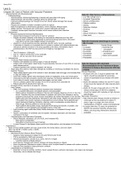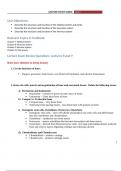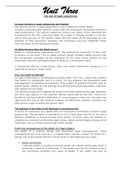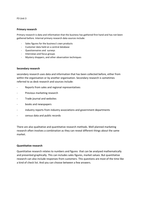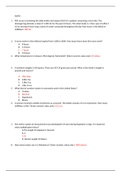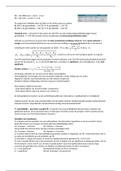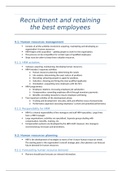FAMILIES AND HOUSEHOLDS
Functionalist perspectives of the family
Sociological theories are explanations of the social world we live in. Sociologists seek to explain
human society and they have different ways of doing so. Usually, they follow one of these two
approaches:
➢ -STRUCTURAL: They have a ‘top down’ approach and try to explain how structures (like
power hierarchy) in society determine individual's lives
➢ SOCIAL ACTION: They have a ‘bottom up’ approach they try to explain how individuals
create society through their actions and free will
Functionalism is a structural theory meaning it believes that the structure of society is responsible
for shaping us as individuals.
➢ For example, the family teaches us how to behave, rather than our actions being governed by
our own choices.
➢ So functionalists are interested in how the family functions for the greater good of society
and how it contributes to the maintenance of social order.
Functionalists believe that society is based on a value consensus – a set of shared norms and values
– into which society socializes its members.
This enables its members to cooperate harmoniously to meet society’s needs and achieve shared goals.
Murdock (1949) argued that the family was a part of the organic analogy
An analogy is a comparison between one thing and another.
The human body is an analogy to society. If an organ fails, the body suffers, just like if the family
becomes dysfunctional, society would collapse.
Murdock believes that the family performs 4 essential functions to meet the needs of society:
1. Sexual
2. Reproduction
3. Economic
4. Education
Parsons was interested in the impact of industrialization on the structure of the family.
The pre-industrial family was a multi-functional unit therefore more self-sufficient
➢ A unit of production
➢ A unit of consumption
Parsons argues that when society industrializes the family not only changes its structure but also loses
some of its functions.
➢ A family ceases to be a unit of production
➢ Family becomes a unit of consumption only
➢ Loses most of its other functions to institutions e.g. schools and the NHS (structural
differentiation)
Parsons argued that this new nuclear family unit provided the husband and wife with very clear and
distinct social roles. Men should be the ‘instrumental leader’, which means the husband is
,responsible for the economic welfare and living standards of the family group. He is the head of
the household and the breadwinner of the family. Women should take the ‘expressive role’, which
means the mother and wife are responsible for the primary socialization of children, and the
emotional care and support of family members.
As a result, the modern nuclear family comes to specialize in performing just two essential or
‘irreducible’ functions:
➢ Primary socialisation
➢ Stabilization of adult personalities
Parsons described the family as a ‘warm bath’, because he believed that the family helps to relieve
stress and tension from work, helps adult personalities to be stabilized, and makes the family members
content
AO3 Criticisms
Murdock is ethnocentric – he sees all types of families based on his own family experiences. He
tries to apply a Western notion of the family across all societies but ignores other types in the process.
The functionalist theory ignores the dark side of the family. The family can be seen as dysfunctional
– there can be child abuse and domestic violence.
Feminists would reject the view that the ‘natural’ role for women is the expressive role. They would
argue that viewpoint to be patriarchal and imposed on by men.
Parsons ignores the impact of global migration on family life in the USA and other industrial
nations. Migration resulted in the diversity of family types which meant the nuclear family no
longer dominated as much as it once did.
Furthermore, Parsons idealized the nuclear family, based largely on the American middle class.
Like Murdock, Parsons failed to explore alternative family structures among different social
classes and ethnic groups.
,Marxism and family structure
The family’s role is shaped by the ‘Base’ of society. The base of society is capitalism. The role of the
family is to maintain a capitalist society and maintain the division between the bourgeoisie and the
proletariat.
Engels argued that the role of the nuclear family was essential. The nuclear and biological families
enabled the ruling classes to pass property onto their heirs.
Zaretsky argues the family transmit a set of ideas to other members. These ideas justify
inequality to convince society that capitalism is just and fair.
➢ He says the family perform an ideological function by making the family appear to be an
apparent ‘haven’, so members can escape from the harsh realities and oppression experienced
at work. However, Zaretsky argues this is an illusion and the family’s role is instead to
prepare men for the next day’s world of work and benefit capitalists, rather than benefit
members of society as a whole. It’s designed so it can undermine opposition to capitalism.
AO3 Criticisms
Engels fails to consider that there are different types of family structures in modern society.
Women have gained greater independence due to improved job opportunities and access to education
which means they no longer need to marry for financial reasons.
Marriage has become less of a social necessity. People marry for love and affection rather than social
obligation.
Zaretsky has been criticised for exaggerating the extent to which the family can be an escape
from alienating work as the family has often been characterised by cruelty, neglect and violence.
Some families are anti-capitalist and socialise their children into beliefs which are critical of the
bourgeoisie.
It ignores the real benefits and positive functions the family can play. It neglects the very real
emotional and social satisfaction that people get from being members of a family.
➢ Marxist have a very narrow perspective on the family regarding it evolving around the
inheritance of private property. Firstly, not all families are nuclear, hence the theory ignores
family diversity. Secondly, anthropologists have found that the emergence of capitalism did
not create the nuclear family – it was already popular before this. Also, in modern, western
society, the family unit is not centred around the leaving of private property to male heirs,
making the theory outdated.
, Maintenance of Capitalism
Marxists also argue that the family maintains and continues capitalism in the following ways
1. Ideological reproduction - the family is an important agent of socialization in the passing on
the” values” of the capitalist system.
For example, discipline, hard work, obedience, and respect for authority are all passed on to
children with the mother usually being the central figure in this transmission
➢ Feminists criticise the theory for blaming capitalism for women’s oppression, whereas they
feel that patriarchy in society is responsible. Nevertheless, Marxists were the first to
identify the disadvantages women face in the family unit and how they are exploited (such
as via free domestic labour) paving the way for later feminists.
2. Physical Reproduction - The family breeds and rears the next generation of workers. This is
very cheap for the capitalist class, as they do not have to bear the costs of the reproduction of
the labour force. One family wage maintains the whole family, while the female provides a source of
free labour in the socialisation of children
3. The family creates a unit of consumption – an important market for the sale of consumer goods
e.g. advertisers target families, children use pester power or are teased by their peers for not having
the ‘latest’
➢ Both Marxists and feminists ignore the fact that domestic violence can be women against
men – with men, raised to be chivalrous, being too well-raised to retaliate and too fearful to
report domestic violence against them due to the attached stigma.
➢ Families have many positive functions, for many members. Marxists ignore these. Families
can be a safe haven for people (men and women) and, especially with the emergence of the
symmetrical family in postmodern society, women now have greater freedom and choice.
Functionalist perspectives of the family
Sociological theories are explanations of the social world we live in. Sociologists seek to explain
human society and they have different ways of doing so. Usually, they follow one of these two
approaches:
➢ -STRUCTURAL: They have a ‘top down’ approach and try to explain how structures (like
power hierarchy) in society determine individual's lives
➢ SOCIAL ACTION: They have a ‘bottom up’ approach they try to explain how individuals
create society through their actions and free will
Functionalism is a structural theory meaning it believes that the structure of society is responsible
for shaping us as individuals.
➢ For example, the family teaches us how to behave, rather than our actions being governed by
our own choices.
➢ So functionalists are interested in how the family functions for the greater good of society
and how it contributes to the maintenance of social order.
Functionalists believe that society is based on a value consensus – a set of shared norms and values
– into which society socializes its members.
This enables its members to cooperate harmoniously to meet society’s needs and achieve shared goals.
Murdock (1949) argued that the family was a part of the organic analogy
An analogy is a comparison between one thing and another.
The human body is an analogy to society. If an organ fails, the body suffers, just like if the family
becomes dysfunctional, society would collapse.
Murdock believes that the family performs 4 essential functions to meet the needs of society:
1. Sexual
2. Reproduction
3. Economic
4. Education
Parsons was interested in the impact of industrialization on the structure of the family.
The pre-industrial family was a multi-functional unit therefore more self-sufficient
➢ A unit of production
➢ A unit of consumption
Parsons argues that when society industrializes the family not only changes its structure but also loses
some of its functions.
➢ A family ceases to be a unit of production
➢ Family becomes a unit of consumption only
➢ Loses most of its other functions to institutions e.g. schools and the NHS (structural
differentiation)
Parsons argued that this new nuclear family unit provided the husband and wife with very clear and
distinct social roles. Men should be the ‘instrumental leader’, which means the husband is
,responsible for the economic welfare and living standards of the family group. He is the head of
the household and the breadwinner of the family. Women should take the ‘expressive role’, which
means the mother and wife are responsible for the primary socialization of children, and the
emotional care and support of family members.
As a result, the modern nuclear family comes to specialize in performing just two essential or
‘irreducible’ functions:
➢ Primary socialisation
➢ Stabilization of adult personalities
Parsons described the family as a ‘warm bath’, because he believed that the family helps to relieve
stress and tension from work, helps adult personalities to be stabilized, and makes the family members
content
AO3 Criticisms
Murdock is ethnocentric – he sees all types of families based on his own family experiences. He
tries to apply a Western notion of the family across all societies but ignores other types in the process.
The functionalist theory ignores the dark side of the family. The family can be seen as dysfunctional
– there can be child abuse and domestic violence.
Feminists would reject the view that the ‘natural’ role for women is the expressive role. They would
argue that viewpoint to be patriarchal and imposed on by men.
Parsons ignores the impact of global migration on family life in the USA and other industrial
nations. Migration resulted in the diversity of family types which meant the nuclear family no
longer dominated as much as it once did.
Furthermore, Parsons idealized the nuclear family, based largely on the American middle class.
Like Murdock, Parsons failed to explore alternative family structures among different social
classes and ethnic groups.
,Marxism and family structure
The family’s role is shaped by the ‘Base’ of society. The base of society is capitalism. The role of the
family is to maintain a capitalist society and maintain the division between the bourgeoisie and the
proletariat.
Engels argued that the role of the nuclear family was essential. The nuclear and biological families
enabled the ruling classes to pass property onto their heirs.
Zaretsky argues the family transmit a set of ideas to other members. These ideas justify
inequality to convince society that capitalism is just and fair.
➢ He says the family perform an ideological function by making the family appear to be an
apparent ‘haven’, so members can escape from the harsh realities and oppression experienced
at work. However, Zaretsky argues this is an illusion and the family’s role is instead to
prepare men for the next day’s world of work and benefit capitalists, rather than benefit
members of society as a whole. It’s designed so it can undermine opposition to capitalism.
AO3 Criticisms
Engels fails to consider that there are different types of family structures in modern society.
Women have gained greater independence due to improved job opportunities and access to education
which means they no longer need to marry for financial reasons.
Marriage has become less of a social necessity. People marry for love and affection rather than social
obligation.
Zaretsky has been criticised for exaggerating the extent to which the family can be an escape
from alienating work as the family has often been characterised by cruelty, neglect and violence.
Some families are anti-capitalist and socialise their children into beliefs which are critical of the
bourgeoisie.
It ignores the real benefits and positive functions the family can play. It neglects the very real
emotional and social satisfaction that people get from being members of a family.
➢ Marxist have a very narrow perspective on the family regarding it evolving around the
inheritance of private property. Firstly, not all families are nuclear, hence the theory ignores
family diversity. Secondly, anthropologists have found that the emergence of capitalism did
not create the nuclear family – it was already popular before this. Also, in modern, western
society, the family unit is not centred around the leaving of private property to male heirs,
making the theory outdated.
, Maintenance of Capitalism
Marxists also argue that the family maintains and continues capitalism in the following ways
1. Ideological reproduction - the family is an important agent of socialization in the passing on
the” values” of the capitalist system.
For example, discipline, hard work, obedience, and respect for authority are all passed on to
children with the mother usually being the central figure in this transmission
➢ Feminists criticise the theory for blaming capitalism for women’s oppression, whereas they
feel that patriarchy in society is responsible. Nevertheless, Marxists were the first to
identify the disadvantages women face in the family unit and how they are exploited (such
as via free domestic labour) paving the way for later feminists.
2. Physical Reproduction - The family breeds and rears the next generation of workers. This is
very cheap for the capitalist class, as they do not have to bear the costs of the reproduction of
the labour force. One family wage maintains the whole family, while the female provides a source of
free labour in the socialisation of children
3. The family creates a unit of consumption – an important market for the sale of consumer goods
e.g. advertisers target families, children use pester power or are teased by their peers for not having
the ‘latest’
➢ Both Marxists and feminists ignore the fact that domestic violence can be women against
men – with men, raised to be chivalrous, being too well-raised to retaliate and too fearful to
report domestic violence against them due to the attached stigma.
➢ Families have many positive functions, for many members. Marxists ignore these. Families
can be a safe haven for people (men and women) and, especially with the emergence of the
symmetrical family in postmodern society, women now have greater freedom and choice.

